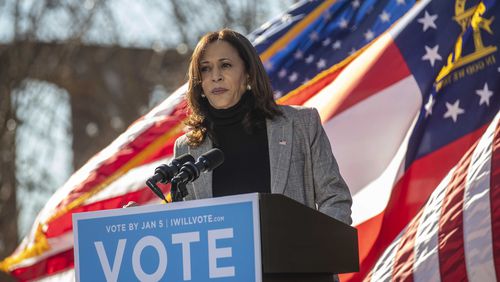Vice President Kamala Harris framed the $2.3 trillion infrastructure proposal in an interview with The Atlanta Journal-Constitution as an essential package that goes beyond repairing decaying roads and bridges and toward lifting living standards and increasing workforce productivity.
As part of a White House campaign to broaden support for the sweeping proposal, known as the American Jobs Plan, Harris told the AJC on Wednesday that it would “improve, update, upgrade and create” a better quality of life for Georgians while enabling a rapid expansion of the economy.
The vice president said the White House’s broad definition of infrastructure, which ranges from utility repairs to improving pay for caregivers, is essential to creating a more resilient and innovative economic foundation to create more jobs and increase the nation’s long-term competitiveness.
“I call it human infrastructure, but it’s infrastructure,” Harris said, adding: “It’s all about the infrastructure that is required to live, those things that are necessary for us to actually function, that we take for granted often.”
The proposal has drawn criticism from Republicans and some centrist Democrats who say financing the project with 15 years of higher taxes on corporations could undercut growth. Some liberals, meanwhile, want more expansive spending on public transportation and other initiatives to help lower-income Americans.
The White House has outlined only broad ways the proposal could affect Georgia, including improving spotty broadband service and reducing traffic congestion. Harris highlighted parts of the program that would spend billions of dollars updating schools, veterans hospitals, and research and development.
“It’s also an investment in America’s future — an investment in research and development and innovation. And Georgia has been a great example of an innovation hub, and this is about continuing to support that.”
Here are excerpts from the Q&A:
On what the proposal would deliver to Georgians:
“Georgians are going to benefit in a tremendous way, mostly because it’s going to create jobs that Georgians want and need. It is going to improve, update, upgrade and create better transportation and better infrastructure for Georgia. It’s going to improve the quality of life for people in terms of their home life. It’s going to contribute billions of dollars so that the elderly and disabled have the care that they need. And it’s also an investment in America’s future — an investment in research and development and innovation. And Georgia has been a great example of an innovation hub, and this is about continuing to support that.”
On some examples of Georgia-specific projects that might get funded:
“I’ve heard countless stories in both urban and rural communities about deteriorating schoolhouses. And this will be about upgrading schoolhouses, so many of our children, especially in public schools who we tell to not drink the water out of the fountain like you and I did when we were kids, because that water is toxic. ... Look at veterans hospitals, which are deteriorating across the country. We owe our veterans so much more, and that’s some of the work that Georgians will see.”
“Broadband — a big issue in Georgia and in all communities. And again, something that COVID highlighted. We have got a lot of work to do to make sure all Americans have access to basic utilities like broadband, so that our kids can do their homework, so our small businesses can push their products, so that people can receive health care through telemedicine. Basic things like that.
“For all of those Georgians who want to participate in the building of infrastructure — plumbers, electricians, pipe fitters — this will not only support their work but also support the extraordinary work around apprenticeship programs so that we can build up America’s workforce.
“These are built around jobs that are not minimum-wage jobs. These are jobs that we intend are going to be paying $30, $40, $50 an hour. These are highly skilled jobs. And the American Jobs Plan is going to create the support around building those skills, around the apprenticeship programs in particular that a lot of our building trades unions offer.”
On the wide-ranging definition of “infrastructure” under the proposal:
“Let’s look at it this way: The way that we think about infrastructure is the things that we need in place to get to work, to take care of our kids, the apparatus that supports working families. In a state like Georgia, there are a whole lot of folks who cannot afford to live where they work, so they’re on those roads and bridges, sometimes for hours. We want to make sure that they don’t have to get on those roads and bridges and then get flat tires because they’re so dilapidated. … That’s the kind of infrastructure that allows working families to go to work.
“Let’s talk about the other kind of infrastructure that allows working families to go to work: caregivers. The pandemic highlighted that a working family with kids cannot go to work unless there is someone taking care of their children — during the day, depending on the age, and after school. And let’s talk about all those folks who are in what we call the sandwich generation. They are raising kids and also taking care of their parents.
“Let’s talk about people with disabilities. We do not talk enough about that whole population of Americans, people with disabilities who deserve to have the kind of care they need to be functional and to participate in society. So that’s all about infrastructure. I call it human infrastructure, but it’s infrastructure. You can’t go to work or do the basics without that stuff. … It’s all about the infrastructure that is required to live, those things that are necessary for us to actually function, that we take for granted often.”
About the Author








